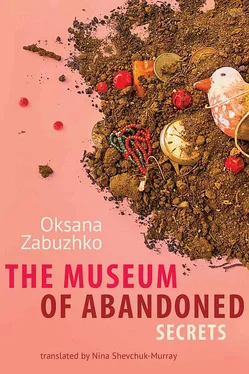It is real. It exists.
Two lines. Two blood-red vertical lines, exactly in the middle. Like a pair of tiny, very straight capillaries that have swelled up and begun to pulsate, instantaneously, and of their own volition.
Over 99% accuracy.
This has happened. And it cannot be undone. She can close your eyes, flush away the test, not tell anyone, and pretend for a while (How long?) that this did not happen; it was just an illusion, a mirage, a sudden instance of astigmatism, double vision. No one else has seen this; no one could testify that there were two lines.
But two is how many there are.
And this is indisputable. Regardless of whether anyone else has seen it. It just—is.
This cannot be replayed. She cannot delete it from her computer, she cannot set the clock back to the “time before,” she cannot say to the darkness, where she cannot see either the director or the cameraman, “I’m sorry, I misspoke there, let’s go back and record again from this point, here, yes.”
It is .
Well, hello then, she thinks—a single breath of her entire being.
And instantly feels terrified.
Who are you?
Somewhere there, inside her, in an invisible cranny, in the self-propelling churn of her hot cells. (Are they actually hot? What is the temperature, pressure, the relative moisture of air in there? Is there even enough air?) Still no one, still not an existence. No machine can find you. But you already are; you are already there. Here.
Like looking into the wrong end of a telescope—a dizzying flight, an immensely long, spiraling tunnel with a golden speck of light at the far end, and coming from there, a moving black dot. She can’t see its shape yet from this far away, but that’s just a matter of time: its approach is irreversible, its velocity known.
Two red vertical lines on the narrow strip of the test stick. The first portrait of a future person.
Of her child.
Ripened: the word surfaces in her memory, something dropped there like a seed from what seems like a thousand years ago. No one speaks like that anymore—ripened—who spoke like that, Grandma Tetyana?
And right away—the next frame, scorchingly vivid, as if it’s just been digitally remastered (Where does it all lie hidden, in what vaults?): little Darochka, Odarka, as her grandmother called her (and she didn’t like it, pouted at Grandma: how crude!), listens, with a massive down blanket pulled all the way over her head (when you dive under a down blanket, you must tuck your feet under you right away and pull your nightdress over them, so as not to lose the warmth: the sheets are stiff and cold, the bed boundless like a snowy desert; in daytime a fluffed-up pyramid of sundry pillows towers on its expanse, pillowcases decorated with strips of embroidery and openwork, whose patterns are also imprinted in her memory as they were on her cheek when she woke up in the morning—you could run your finger over every stitch). The doors are open from the dark around her (a tunnel) to where the fire glows in the stove, where they are talking: her mom (she is the one who brought Darochka to visit Grandmother), Grandma Tetyana, and Aunt Lyusya. Grandma talks loudly as rural people, unaccustomed to whispering so as not to wake someone else, usually do, and Mom keeps shushing at her—every time she does, all three peer from their end of the tunnel into the room with the enormous wooden bed, where Darochka has hidden. Then Grandma Tetyana inquires—loud as a churchbell—“Is she asleep?” and the conversation resumes at the same volume as before.
Darochka is waiting for Mom to come to bed with her (then it’ll be warm), and words she doesn’t quite understand, the resonant and mysterious ripened among them—at first Darochka thinks it’s about a plant, but then realizes it is not—waft toward her, churning her sleep like oars beating on water: “When I was ripened with you, it happened to me too,” rises Grandma Tetyana’s voice (a contralto), and Darochka wishes desperately that her eyes weren’t so heavy and that she could grasp what it is they are talking about, but she can’t—all she gets is a tinge of something unattainably mysterious and solemn, so solemn that Mom has forgotten about Darochka and says something to Grandma Tetyana in a lowered voice, while tossing one new log after another into the stove, to keep the fire going, like in Darochka’s fairytale rhymes, burning high and bright, and Grandma goes on “and I knew I’d have a girl because I had a dream….”
A dream? She’s had no dreams. No special dreams at all—except that one , Adrian’s last dream in which they were together, in the same movie theater the whole night—breaking out of it, every so often, as if for a smoke out in the darkness, surfacing to the light of the nightlamp. She remembers that light shining on Adrian’s head as he bent over the bedside table, the hair at the nape of his neck, a few backlit ruffled strands of it when he sat up to write himself a note, barely awake; and the recollection instantly makes the room go misty before her eyes, as they swell with tears of tenderness, and without realizing it, she spreads her knees like a cello player and touches herself where her yearning furrow took the fallen seed: it’s Aidy’s; it came from him. It’s his.
That’s when it happened. Now she feels like she has known this from the beginning. From that very night. Oh, that night. In the mirror above the sink, Daryna sees her lips stretch in a spontaneous spellbound smile. How could such profusion of life be contained in such a short amount of time? Years packed tight, like electrons in an atom’s nucleus, something else from nuclear physics that Aidy explained….
Love me. Love me all the time—and together, knit indivisibly into one, grown into each other, we enter the same tunnel, the same movie theater, and leave it together, too, wincing at the daylight, unable to tell which limbs are whose, and before that, you were inside me again, while I slept, thrust after thrust, the film rolls; don’t leave me; it’s moist, fertile, fecund; we melt the snow below us; the ground washes away; we are lying in a pool of tears on the bare surface of a sad planet where everything once went wrong and must begin anew—bacteria, amoebas, the first man and the first woman, a new era, did you see? Yes, I did, they all died, and we return again to the place where the same movie is being played for the two of us, the film rips into white flashes inside the single mind knit from our two minds, machine-gun fire goes right through me, the fiery bullets explode inside me, a cannonade.
How many times did it happen that night, seven, eight? He was the one who counted, then laughed in the morning that he couldn’t keep track, either; and she remembered everything as a whole, a single roiling river, hot as lava, that rolled and rolled carrying her with it…. How much life they were given in a single night! Their wedding night. Their wedding, that’s what it was—the night of their wedding. Their marriage—to the toll of someone else’s deathbell.
A family now. Forever.
They married us , Daryna thinks, speaks the thought to herself from beginning to end, completely, for the first time—gives voice to the idea, which, until now, merely stirred inside her, a half-guess afraid to become words: those who died that night in the bunker, married us. They knew .
The tile floor feels cold beneath her feet, and she pulls her nightgown over her knees, unseeing.
It’s pointless now, as it always is in moments when you realize that something irreversible has happened, to let her mind ramble, feverishly shuffling the deck of circumstances this way and that, to pull and tug at them like on a purse caught in the subway doors: How, why, it can’t be, how could it possibly have happened—she’s been swallowing those pills, expensive as hell, religiously, and by the calendar, too, it seemed too early? What went on between them that night could not be contained by any calendar or pharmacological formula—companies fold, factories go under. That was stronger.
Читать дальше












